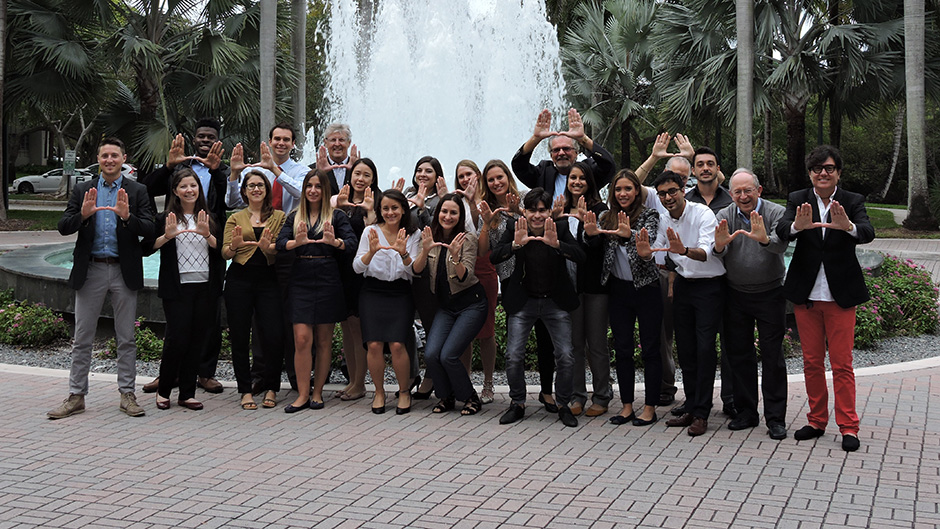The University of Miami’s Center for International Business Education & Research (CIBER) was recently selected by the U.S. Department of Education as the only Florida-based university to have their $1 million grant funded, with UM providing an equal match to continue a program that has demonstrated solid success over the last 30 years. UM CIBER continues to thrive and survive although more than half the CIBER programs were cut after the 2008 global meltdown.
CIBER programs were created by Congress under the Omnibus Trade and Competitive Act of 1988, and administered by the U.S. Department of Education under Title VI, Part B of the Higher Education Act of 1965. The CIBER network links the manpower and technological needs of the U.S. business community with the international education, language training, and research capabilities of universities across the country.
A catalyst for innovation and new ventures, CIBER builds upon the program’s original intention to assist U.S. businesses to globally compete. With more than 50 UM faculty members from 12 schools, colleges and centers working together, UM’s reputation is reinforced as a global university with a distinct hemispheric advantage as CIBER leverages Miami’s strengths and reputation as a gateway to the Americas.
Led for the past six years by School of Business Administration Professor Joseph Ganitsky and his staff of two, CIBER has pursued innovation by creating more participatory learning experiences through a multitude of different programs for both students and faculty. Students from disciplines outside of business have joined with CIBER’s more than 35 programs to develop cross cultural, language, technical and entrepreneurial competencies to succeed in emerging markets in general, and Latin America in particular.
“I consider myself an ‘academic entrepreneur,’” Ganitsky said. “Through CIBER, I can contribute and develop innovative ideas that advance the competitive position of UM and the U.S. in the world economy. We think there are universities and communities where we need to enhance U.S. competitiveness. By design, the CIBER program must be fostering change.”
The Innovators for the Americas program brings students together from the College of Engineering and the School of Business Entrepreneurship programs. The students work together with their peers from top universities in Latin America to provide affordable access to technology and basic services to underserved populations. Together the students develop business plans to address social issues by leveraging U.S. technology and advance student learning by encouraging new pedagogical approaches, embedded in the students cross-disciplinary and cross-cultural competencies.
Earlier this year a group of students met at UM, and agreed on their goals and methods under the leadership of Greg Smogard, CIBER champion and director of Innovators for the Americas.
“This is a very unique and dynamic program that offers UM students the opportunity to work on a team with other international students to develop and to improve their skills in innovation, international business, entrepreneurship and collaboration,” said Smogard. “We launched the program last semester with UM business and engineering students, the Universidad del Pacifico in Lima, Peru and the Universidad ICESI in Cali, Colombia. During the semester, the student teams worked virtually to develop business plans and then travelled to Peru to finalize and pitch their ideas to a panel of judges from the various universities. The program was so successful that next semester, we plan on significantly expanding both the number of students and participating universities in Latin America.”
Meanwhile CIBER’s Global Business Consulting program is growing, with five consulting clients in Latin America and one in China. The program brings together top graduate students in teams of five to six, to consult on international projects directed by the corporation. Over a three-month period, students are mentored by their corporate client and a CIBER faculty member as their academic adviser, while working virtually at the international company. After completing their analyses while in-country, students present their solutions to the company’s executives after the project, facilitating joint training opportunities and building capacities for other organizations in the hemisphere.
Over spring break, graduate students are offered options to travel to do field study abroad with the Global Learning Opportunities in Business Education (GLOBE). Students can apply their learnings through these global immersions, as they are exposed to the cultural, economic, and political dimensions of doing business internationally. Earlier this year, three groups of students traveled to Brazil, China and India. They visited local universities, companies and NGOs to learn best practices, and how the business climate affected the strategies, growth and operations of companies. This experience has provided 100 students with firsthand knowledge of factors influencing U.S. leadership and competitiveness.
“The global immersion trip to Brazil was a unique and intensive firsthand learning experience. From company visits where students interact with executives across several industries, to cultural excursions where students gain a better feel for the country and its people, their awareness is dramatically magnified about the opportunities and challenges of doing business,” said Tallys Yunes, associate professor of management science and faculty lead for GLOBE Brazil 2016.
Locally, the CIBER program’s positive effect on community engagement includes UM students using their leadership and management skills to mentor local high school students. As a student in Ganitsky’s international administration course, Jorge Mendez designed a class project that became part of CIBER after he graduated.
“I designed what became Innovate:Miami, a social entrepreneurship initiative that teaches economically disadvantaged high school students to assist their community by designing social enterprises. After the final day of class, Professor Ganitsky suggested I contact him if I was interested in applying the project in the real world. The class began a journey with the UM CIBER office that has shaped who I am today. The UM CIBER team believed in me and gave me full creative freedom to fail, learn, pivot and succeed,” Mendez said.

